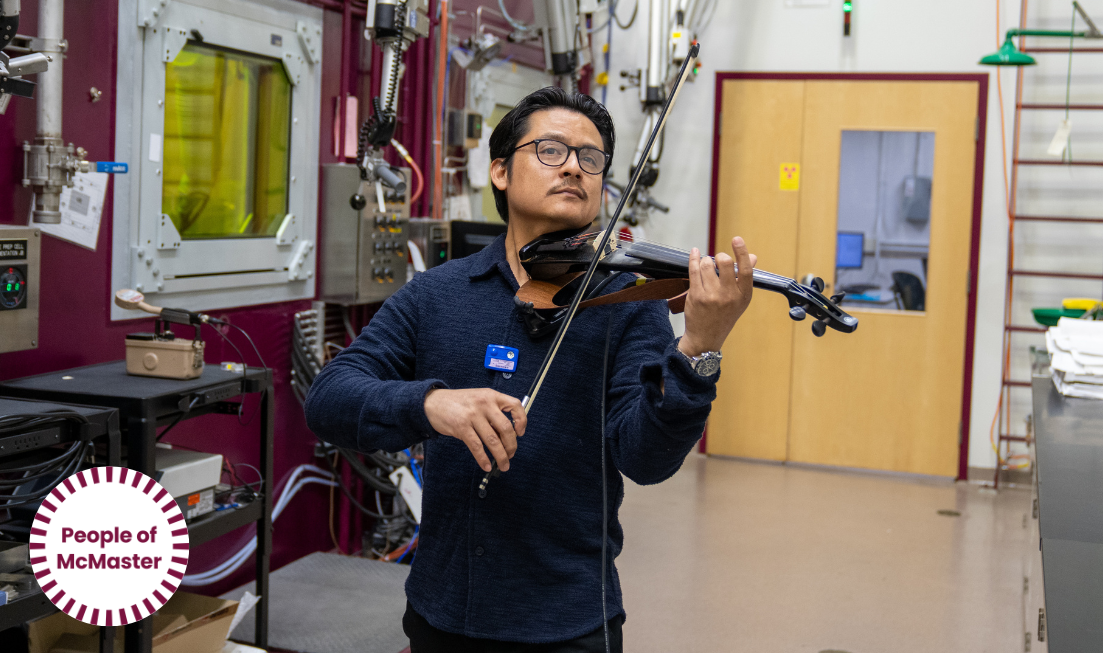The Phantom of the Tandem Accelerator

Alain Pamuce is a custodian, a teacher, a learner and above all, a musician. (Georgia Kirkos, McMaster University)
People of McMaster is a series celebrating the incredible people who help make McMaster a great place to work, learn, teach and conduct research. This is the eighth instalment of this series. Click here for the previous one.
Between cleaning floors and sanitizing desks, Alain Pamuce fills the labs of the Tandem Accelerator Building with music, singing opera from his classical repertoire.
Pamuce once had a vibrant career as a musician and teacher, using music to empower vulnerable youth. In his current role, he’s found a way to stay in touch with what he values, while working toward his goal of returning to the classroom.
Having faced many hurdles in life, Pamuce talks about about the beauty in work, reminding us that our passion and commitment are what truly define us.
Tell me about your journey to working at McMaster
This is my first job in Canada, but before this, I’ve always worked in education, so it’s an environment that makes me feel comfortable, safe.
I was an elementary teacher for eight years. It’s complicated when you don’t have a work history in this country, but I realized that if I applied for this job at Mac, I will have a platform to start my path.
I studied music all my life and became a music teacher. I was the conductor for a children’s orchestra of about 80 kids.
My first year as a teacher was hard. I said to myself, “What am I going to do now?” Because I really love music, but nobody loves it in my classroom. I used to see a lot of kids with broken families, sick mothers or worse.
So, I went to college and started to study psychology to help kids use music lessons as a tool to focus, concentrate and build resilience. Of the 1,000 students I had, probably three of them are professionals now, but my goal was to decrease their anxiety.
In 2018, I suffered an accident. I used to ride motorcycles. What I was doing with my students, I had to apply to myself. It was very complicated not to move for six months in bed. Your mind starts creating a lot of scenarios.
I still feel the effects of the accident, but I’ve learned to live with the pain — It helps me know I’m alive.
How has working at McMaster influenced your personal and professional growth?
I am very happy to work here. The people around here are super nice and super smart.
That’s another reason why I looked for a job at a university: If you surround yourself with smarter people, you learn. It’s better, like my mama said, to be the tail of the snake than the head of a mouse.
Here, I can speak with engineers in radiation, physicians or mathematicians. I’m not saying I’m a smart guy, but I like to talk with people to learn.
That’s why I’m here — to talk with smart people and be a little bit better every day.
How does your passion for music come out in your work?
Most of my job is doing the floors. I mop a lot of floors around here. In some buildings, they are filled with people during the day. In others, I am often the only one. There are a couple of labs where nobody can get in and the acoustics are pretty nice.
When I’m up there, I sing in Italian, German, Spanish — all classical repertoire. In the empty labs, I am the Phantom of the Tandem Accelerator.
I still teach music on weekends. I’m a singer, but I also teach violin and play drums and keyboards. I play at weddings and events. Sometimes I go to Toronto and busk outside. I like the interaction with people.
Staying connected to music helps me keep my objectives straight. What I do for a living doesn’t encompass what I am. I’m always trying to keep what I am, and that’s a musician.
How have your personal experiences influenced the way you approach your daily life?
I always try to live as much as I can with the time I have. When I was a student in my second year of psychology studies, I studied Michael G. Flaherty and his theory about the density of conscious information.
Basically, we can’t extend our lives, but we can make them feel longer by having certain experiences. Every day has 24 hours, and you sleep eight, so the amount of time you are awake is short. Time on your cellphone, fighting with your wife or watching TV is time lost.
You have to construct a schedule of your life where you are learning things and living through experiences with the people you love — and I love my wife very much.
Because I’ve been through traumatic events, good and bad, it helps me rethink what I am doing every day. Yes, I’m a custodian, I clean floors, but my mind is in another place.
Every day, I fill my brain with information — some more useful than the rest, but it’s still all new information. At almost 39 years old, I can say that I have lived my life fully, with plenty of experiences.
What’s next for you?
I’m waiting for my permanent residency. I have two bachelor’s degrees, and I hope in the near future I will be able to return to teaching. Once I get my PR, I’m going to take courses here and return to music therapy.
For now, I’m happy with my work because by keeping the campus clean, I am helping the health of the people. It makes me feel happy with what I do.


